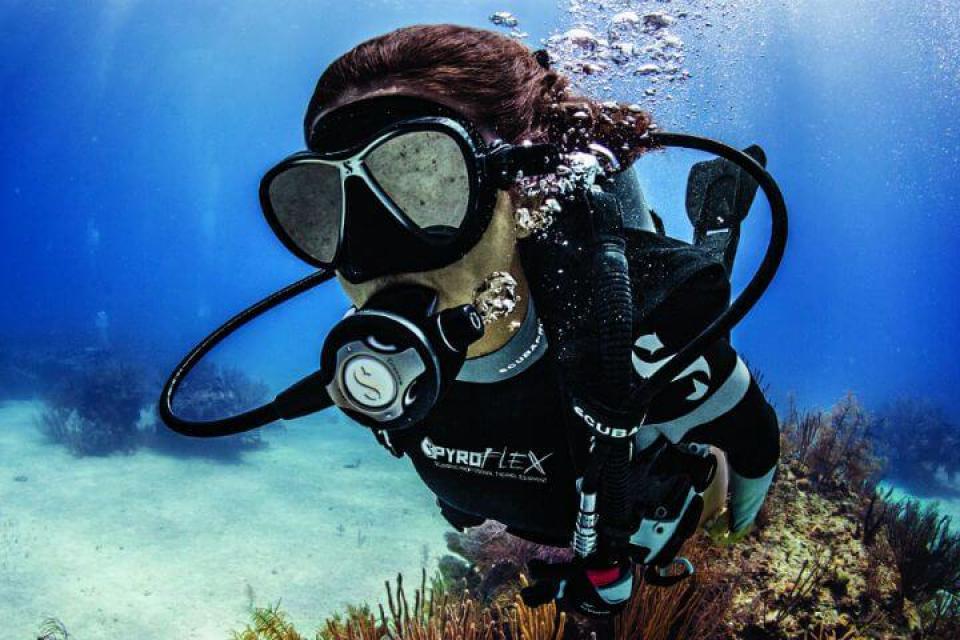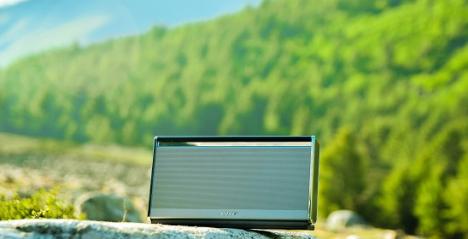Kev from Dublin, Ireland learned to dive back in the year 2000 in Thailand. After dabbling in scuba for a few years as a non-professional diver, diving only on vacation he finally decided to quit his head hunter job, jack it all in and return to where it all began.
By the end of 2008 he was a PADI instructor at the beginning of a new career beneath the waves. In Thailand he met his “other love” Sim (Orca Scuba Head Instructor) and never looked back.
How to find the “perfect fit”, how to care for your mask before and after scuba diving and why you should not be afraid to take it off underwater.
You have become a new scuba diver or you are thinking of taking up diving and wonder what essential pieces of equipment you will need to begin with. Every instructor will tell you that the most important piece of equipment that you can own is a mask. But, why is owning your own mask so important?
Each and every face is different, some people`s faces are wide, some are narrow, some have flat noses, some noses stick out, some people`s eyes are closer together or further apart etc. The main point is, a mask needs to fit your face correctly to create a good seal and prevent water from entering.
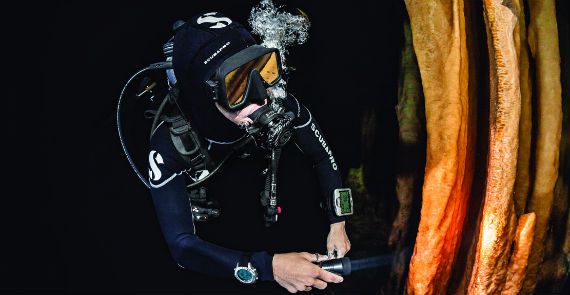
Why is this so important?
The answer is simple, if the mask fills with water, this defeats the purpose of wearing one. The reason you are wearing it in the first place is to create a pocket of air so your eyes can focus under water and you can see.
There is nothing more frustrating than having to continuously clear a leaking mask on a dive, not only does it distract you from enjoying the underwater world, but it will also make you consume your air way more quickly.
Most dive centers will have a limited amount of rental mask styles to choose from, they will usually opt for one or two types that tend to fit “most” faces. Unfortunately, if you don’t fall into their category of mask, you might be stuck with a leaky one that can ruin your dive or worse put you off diving altogether!
Another point to consider is, and all divers know this, scuba diving is a “mucus liberating” activity and it is nice to know that only your own has been floating around in your mask.

So to make sure you always enjoy your dives, here are 6 things to consider to find the best scuba mask for you:
1. Fit (the most important aspect)
Don’t be seduced by the plethora of mask features, style & colours. Don’t settle for anything less than a perfect fit, you will be happier for it.
Follow these simple steps for a perfect mask fit:
• Strap off: Remove the strap or place it in front of the lens.
• Look up: Look up. Place the mask in position and ensure that there is no hair or anything trapped between the mask skirt and your face. It should rest comfortably and evenly all around your face and stay in place without relying on the strap.
If you feel pressure on the bridge of your nose or the mask or nose pocket is pressing hard against your nostrils, it is not the right fit for you and you need to try a different model.
• Pinch your nose: The nose pocket of the mask is there so you can equalize your sinus air spaces by pinching your nose, if you can’t reach it you may not be able to equalize.
• Breathe in: Now, breathe in gently through your nose, and then hold your breath. The mask should stay on your face without you holding it with your hands. Look forward and slowly shake your head side to side, up & down; It should still stay stuck in place, once you exhale it will come off.
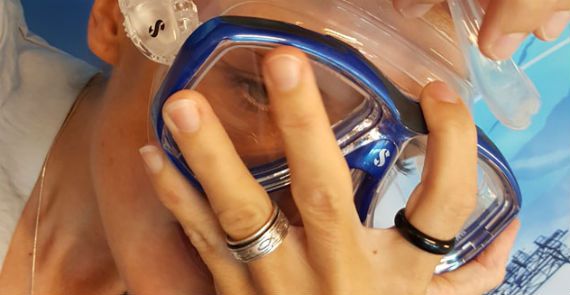
2. Angle of the Lens
The angle of the mask frame to a divers face does not normally run parallel.
• Masks with a small angle sit closer to a divers face. This reduces the internal volume of the mask and therefore, makes it easier to clear.
• It also increases the field of view making it easier to look down as the bottom part of the lens is closer to your cheekbones.

3. Single lens, dual & multiple lenses
Masks will have either a single lens, dual - or multiple lenses.
• Single lens masks don’t have any frame across the bridge of the nose making the field of vision less obstructed and are less likely to push against a divers forehead.
• In dual or twin lens masks the lenses can be replaced with prescription lenses.
• Multiple lens masks usually have additional “windows” on each side creating a more open field of vision.
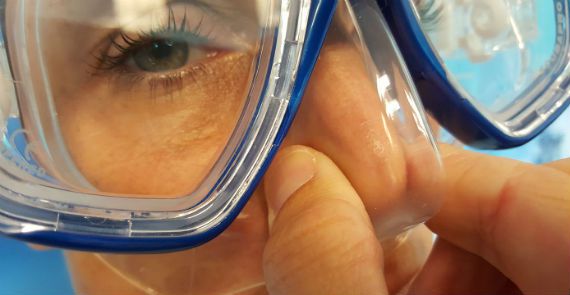
4. Skirt of the mask
The skirt of a mask`s main purpose is to provide a good seal keeping the water out and the air in.
• High grade silicone is used by most manufacturers, to make their skirts. The models with a secondary skirt increase the seal and reduces leaks.
• Find one that feels most comfortable on you.
5. Mask frame
Some masks come with the components fixed to the frame, on others they are fixed to the skirt. There are also frameless models where the silicone skirt is molded around the lens and its other components, making them slim and easy to keep in pockets.
• Pick one that best suits your needs.
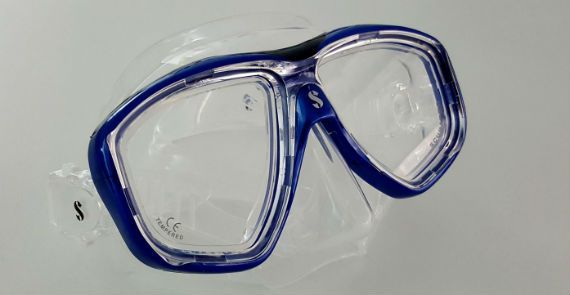
6. The finish
Once you have found the right fit, the next step is picking your style. Masks generally come in a clear or black silicone. What you choose is really down to personal preference, but here are a few tips to help you decide.
Clear silicone let’s in more light, giving a more “open” feeling which can help, if you have a tendency to feel claustrophobic. Black silicone in comparison, gives a more focused field of vision and is a favourite of videographers and photographers that don’t want to be distracted by everything going on around them.
A build-up of dirt shows more easily in a clear mask and it is also more prone too de-colouration from sun light or chlorine water, however, if you care for your mask correctly this should not be a big problem.
The frames and buckles of a mask come in a variety of different colours to match equipment. Now, mirrored or smoked lenses offering UV protection and various filtering affects along with colored silicone is becoming more popular
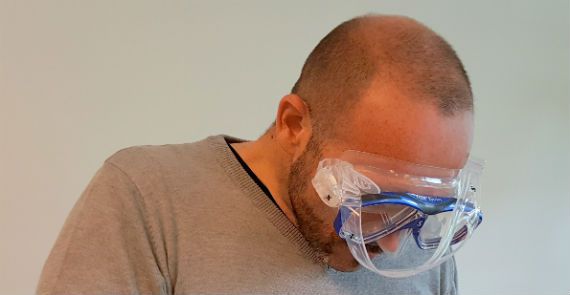
Ask for help from the dive professional in the shop when choosing a mask, most of them are experienced divers who are trained to fit equipment. We highly recommend trying the mask on before buying it to make sure that it fits correctly.
Don’t scrimp when buying a diving mask, they should be considered a long term investment. Diving masks are not the same as snorkeling masks (though they have the benefit of being able to be used for snorkeling) their components need to be way more durable, are of a much higher quality and therefore, cost more. When looked after properly they can last a long time, cutting out on recurrent rental costs.
Like most things, if you would like your mask to lest you need to look after it correctly. Here is how:
Basic care of your scuba mask
You should always rinse your dive mask in fresh water after every use. To dissolve salt particles warm water works better. Dry the mask completely before putting away. Store your mask away from direct sunlight and place in a dry location.
Masks are rugged, but can still be damaged. When the mask is dry store it in its original case to prevent knocks.
When entering the water keep your mask on and held in place. If you need to take it off while floating on the surface it is generally considered bad practice to keep it on your forehead where it can easily become dislodged and get lost. Keeping it around your neck means it is almost impossible to lose.
Why it is important to become comfortable with water in your mask?
Your mask is not a magical force field blocking all contact from the outside world, it’s a mask! In accordance with the laws of physics it will occasionally let some water in, even with a perfect fit!
Smiling underwater, the careless misplaced hand of your buddy and facial hair are just some things that could cause water to enter.
This is why throughout the various scuba training and courses you learn how to clear your mask and even to remove and replace it underwater, however, having a perfectly fitting mask will dramatically reduce the amount and likeliness of water to enter.
Orca Scuba stock a huge selection of masks from all the top brands at their online store and also in-store on the second floor at Queensway Shopping Center, drop by, say hello and let one of their experienced staff help you find the perfect mask, Keep a look out for other Orca Scuba articles about fitting equipment and becoming a more confident diver.
Brought To You By Expat Choice

